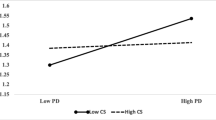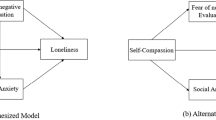Abstract
Perceived social support was found to play an important role in reducing procrastination. However, little is known about the psychological mechanisms underlying this relation. Based on the integrated model of social support, the current study investigated the effect of the perceived social support on procrastination, and further explored the mediating role of self-compassion and negative emotions in this relation in a sample of 874 Chinese college students. Results showed: (a) perceived social support negatively predicted procrastination; (b) both self-compassion and negative emotions partially mediated the association between perceived social support and procrastination separately; (c) self-compassion and negative emotions sequentially mediated the relation between perceived social support and procrastination. This study provides new insights for the mechanisms between perceived social support and procrastination, which has important practical implications for the interventions of college students’ procrastination.

Similar content being viewed by others
Data Availability
The datasets generated during and analysed during the current study are available from the corresponding author on reasonable request.
References
Barnard, L. K., & Curry, J. F. (2011). Self-compassion: Conceptualizations, correlates, & interventions. Review of General Psychology, 15, 289–303.
Breines, J. G., & Chen, S. (2012). Self-compassion increases self-improvement motivation. Personality & Social Psychology Bulletin, 38(9), 1133–1143.
Chen, B., & Qu, W. (2017). Life history strategies and procrastination: The role of environmental unpredictability. Personality and Individual Differences, 117, 23–29.
Cho, H. Y., Kim, D. J., & Park, J. W. (2017). Stress and adult smartphone addiction: Mediation by self-control, neuroticism, and extraversion. Stress & Health, 33, 624–630.
Cohen, S., & Wills, T. A. (1985). Stress, perceived social support, and the buffering hypothesis. Psychological Bulletin, 98(2), 310–357.
Dundas, I., Binder, P. E., Hansen, T. G. B., & Stige, S. H. (2017). Does a short self-compassion intervention for students increase healthy self-regulation? A randomized control trial. Scandinavian Journal of Psychology, 58(5), 443–450.
Erzen, E., & Cikrikci, O. (2018). The role of school attachment and parental social support in academic procrastination. Turkish Journal of Teacher Education, 7(1), 17–27.
Fatima, S., Rizvi, S. Z. S., & Jamal, S. R. (2020). Perceived social support, health procrastination and flourishing in cancer patients. International Journal of Social Science Studies, 8(5), 1148–1159.
Feeney, B. C., & Collins, N. L. (2015). A new look at social support: A theoretical perspective on thriving through relationships. Personality and Social Psychology Review, 19(2), 113–147.
Ferrari, J. R., Harriott, J. S., & Zimmerman, M. (1999). The perceived social support networks of procrastinators: Friends or family in times of trouble? Personality and Individual Differences, 26(2), 321–331.
Ferrari, J. R., O' Callaghan, J., & Newbegin, I. (2005). Prevalence of procrastination in the United States, United Kingdom, and Australia: Arousal and avoidance delays among adults. North American Journal of Psychology, 7(1), 1–6.
Flett, A. L., Haghbin, M., & Pychyl, T. A. (2016). Procrastination and depression from a cognitive perspective: An exploration of the associations among procrastinatory automatic thoughts, rumination, and mindfulness. Journal of Rational-Emotive & Cognitive-Behavior Therapy, 34(3), 169–186.
Flynn, M., Kecmanovic, J., & Alloy, L. B. (2010). An examination of integrated cognitive-interpersonal vulnerability to depression: The role of rumination, perceived social support, and interpersonal stress generation. Cognitive Therapy & Research, 34(5), 456–466.
Geng, J., Han, L., Gao, F., Jou, M., & Huang, C. (2018). Internet addiction and procrastination among Chinese young adults: A moderated mediation model. Computers in Human Behavior, 84, 320–333.
Haghbin, M., Mccaffrey, A., & Pychyl, T. A. (2012). The complexity of the relation between fear of failure and procrastination. Journal of Rational-Emotive & Cognitive-Behavior Therapy, 30(4), 249–263.
Hayes, A. F. (2013). Introduction to mediation, moderation, and conditional process analysis: A regression-based approach. Guilford Press.
Jacobson, N. C., Lord, K. A., & Newman, M. G. (2017). Perceived emotional social support in bereaved spouses mediates the relationship between anxiety and depression. Journal of Affective Disorders, 211, 83–91.
Kim, K. R., & Seo, E. H. (2015). The relationship between procrastination and academic performance: A meta-analysis. Personality and Individual Differences, 82, 26–33.
Kim, Y. H., Chiu, C. Y., & Zou, Z. (2010). Know thyself: Misperceptions of actual performance undermine achievement motivation, future performance, and subjective well-being. Journal of Personality & Social Psychology, 99(3), 395–409.
Lai, Y., & Lin, W. (2018). Relations among perceived social support, subjective well-being and academic procrastination of rural left-behind children. Journal of Shaanxi Xueqian Normal University, 34(5), 23–27.
Lay, C. H. (1986). At last, my research article on procrastination. Journal of Research in Personality, 20(4), 474–495.
Lee, D. G., Kelly, K. R., & Edwards, J. K. (2006). A closer look at the relationships among trait procrastination, neuroticism, and conscientiousness. Personality and Individual Differences, 40(1), 27–37.
Lovibond, P. F., & Lovibond, S. H. (1995). The structure of negative emotional states: Comparison of the Depression, Anxiety, Stress Scales (DASS) with the Beck Depression and Anxiety Inventories. Behaviour Research and Therapy, 33(3), 335–343.
Luo, Y., Meng, R., Li, J., Liu, B., Cao, X., & Ge, W. (2019). Self-compassion may reduce anxiety and depression in nursing students: A pathway through perceived stress. Public Health, 174, 1–10.
Lyubomirsky, S., & Layous, K. (2013). How do simple positive activities increase well-being? Current Directions in Psychological Science, 22, 57–62.
Madjid, A., Sutoyo, D. A., & Shodiq, S. F. (2021). Academic procrastination among students: The influence of social support and resilience mediated by religious character. Cakrawala Pendidikan, 40(1), 56–69.
Mahasneh, A. M., Bataineh, O. T., & Al-Zoubi, Z. H. (2016). The relationship between academic procrastination and parenting styles among Jordanian Undergraduate University students. The Open Psychology Journal, 9(1), 25–34.
Maheux, A., & Price, M. (2015). Investigation of the relation between PTSD symptoms and self- compassion: Comparison across DSM IV and DSM 5 PTSD symptom clusters. Self and Identity, 14(6), 627–637.
Neff, K. (2003). Self-compassion: An alternative conceptualization of a healthy attitude toward oneself. Self and Identity, 2(2), 85–101.
Neff, K. D., & Mcgehee, P. (2010). Self-compassion and psychological resilience among adolescents and young adults. Self & Identity, 9(3), 225–240.
Özer, B. U., Demir, A., & Ferrari, J. R. (2009). Exploring academic procrastination among Turkish students: Possible gender differences in prevalence and reasons. Journal of Social Psychology, 149(2), 241–257.
Pychyl, T. A., & Flett, G. L. (2012). Procrastination and self-regulatory failure: An introduction to the special issue. Journal of Rational-Emotive & Cognitive-Behavior Therapy, 30(4), 203–212.
Pychyl, T. A., Coplan, R. J., & Reid, P. A. M. (2002). Parenting and procrastination: Gender differences in the relations between procrastination, parenting style and self-worth in early adolescence. Personality and Individual Differences, 33, 271–285.
Raes, F., Pommier, E., Neff, K. D., & Gucht, D. V. (2011). Construction and factorial validation of a short form of the Self-Compassion Scale. Clinical Psychology & Psychotherapy, 18(3), 250–255.
Rebetez, M., Rochat, L., Barsics, C., & Van der Linden, M. (2016). Procrastination as a self-regulation failure: The role of inhibition, negative affect, and gender. Personality and Individual Differences, 101, 435–439.
Robinson, N. S. (1995). Evaluating the nature of perceived support and its relation to perceived self-worth in adolescents. Journal of Research on Adolescence, 5(2), 253–280.
Ross, L. T., Lutz, C. J., & Lakey, B. (1999). Perceived social support and attributions for failed support. Personality and Social Psychology Bulletin, 25(7), 896–908.
Sadeghi, H., Hajloo, N., & Emami, F. (2011). The study of relationship between obsessive beliefs and procrastination among students of Mohagheghe ardabili and Marageh universities. Procedia Social & Behavioral Sciences, 30, 292–296.
Sari, W. L., & Fakhruddiana, F. (2019). Internal locus of control, social support and academic procrastination among students in completing the thesis. International Journal of Evaluation and Research in Education, 8(2), 363–368.
Schraw, G., Wadkins, T., & Olafson, L. (2007). Doing the things we do: A grounded theory of academic procrastination. Journal of Educational Psychology, 99(1), 12–25.
Sirois, F. M. (2007). “I’ll look after my health, later”: A replication and extension of the procrastination–health model with community-dwelling adults. Personality and Individual Differences, 43(1), 15–26.
Sirois, F. M. (2014). Procrastination and stress: Exploring the role of self-compassion. Self and Identity, 13(2), 128–145.
Sirois, F. M., & Pychyl, T. A. (2013). Procrastination and the priority of short-term mood regulation: Consequences for future self. Social and Personality Psychology Compass, 7(2), 115–127.
Sirois, F. M., Nauts, S., & Molnar, D. S. (2019). Self-compassion and bedtime procrastination: An emotion regulation perspective. Mindfulness, 10, 434–445.
Smeets, E., Neff, K., Alberts, H., & Peters, M. (2014). Meeting suffering with kindness: Effects of a brief self-compassion intervention for female college students. Journal of Clinical Psychology, 70(9), 1–15.
Stallman, H. M., Ohan, J. L., & Chiera, B. (2018). The role of perceived social support, being present, and self-kindness in university student psychological distress. Australian Psychologist, 53, 52–59.
Stead, R., Shanahan, M. J., & Neufeld, R. W. J. (2010). “I'll go to therapy, eventually”: Procrastination, stress and mental health. Personality and Individual Differences, 49, 175–180.
Steel, P. (2007). The nature of procrastination: A meta-analytic and theoretical review of quintessential self-regulatory failure. Psychological Bulletin, 133(1), 65–94.
Terry, M. L., & Leary, M. R. (2011). Self-compassion, self-regulation, and health. Self & Identity, 10(3), 352–362.
Tice, D. M., & Baumeister, R. F. (1997). Longitudinal study of procrastination, performance, stress, and health: The costs and benefits of dawdling. Psychological Science, 8(6), 454–458.
Tice, D. M., Bratslavsky, E., & Baumeister, R. F. (2001). Emotional distress regulation takes precedence over impulse control: If you feel bad, do it! Journal of Personality and Social Psychology, 80, 53–67.
Tomlinson, J. M., Feeney, B. C., & Van Vleet, M. (2016). A longitudinal investigation of relational catalyst support of goal strivings. The Journal of Positive Psychology, 11, 246–257.
van Eerde, W., & Klingsieck, K. B. (2018). Overcoming procrastination? A meta-analysis of intervention studies. Educational Research Review, 25, 73–85.
Wen, M., & Lin, D. (2012). Child development in rural China: Children left behind by their migrant parents and children of nonmigrant families. Child Development, 83(1), 120–136.
Wilson, J. M., Weiss, A., & Shook, N. J. (2020). Mindfulness, self-compassion, and savoring: Factors that explain the relation between perceived social support and well-being. Personality and Individual Differences, 152, 109568.
Wohl, M. J. A., Pychyl, T. A., & Bennett, S. H. (2010). I forgive myself, now I can study: How self-forgiveness for procrastinating can reduce future procrastination. Personality and Individual Differences, 48, 803–808.
Yang, X., Wang, P., & Hu, P. (2020). Trait procrastination and mobile phone addiction among Chinese college students: A moderated mediation model of stress and gender. Frontiers in Psychology, 11, 614660.
Zakeri, H., Esfahani, B. N., & Razmjoee, M. (2013). Parenting styles and academic procrastination. Procedia-Social and Behavioral Sciences, 84, 57–60.
Zhang, H., Chi, P., Long, H., & Ren, X. (2019). Bullying victimization and depression among left behind children in rural China: Roles of self-compassion and hope. Child Abuse & Neglect, 96, 104072.
Funding
This study is supported by National Social Science Foundation of China (Major Program) (19ZDA021).
Author information
Authors and Affiliations
Contributions
Xiaofan Yang and Jingru Zhu designed the study; Xiaofan Yang collected and analyzed the data; Jingru Zhu and Xiaofan Yang wrote the manuscript; Ping Hu revised the manuscript.
Corresponding author
Ethics declarations
Disclosure of Interest
Author Xiaofan Yang, Author Jingru Zhu and Author Ping Hu declare that they have no conflict of interest.
Additional information
Publisher’s Note
Springer Nature remains neutral with regard to jurisdictional claims in published maps and institutional affiliations.
Xiaofan Yang and Jingru Zhu should be considered joint first author
Rights and permissions
About this article
Cite this article
Yang, X., Zhu, J. & Hu, P. Perceived social support and procrastination in college students: A sequential mediation model of self-compassion and negative emotions. Curr Psychol 42, 5521–5529 (2023). https://doi.org/10.1007/s12144-021-01920-3
Accepted:
Published:
Issue Date:
DOI: https://doi.org/10.1007/s12144-021-01920-3




